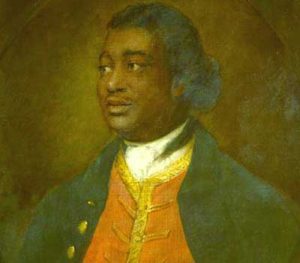One of my favorite Georgian novels is The Life and Opinions of Tristram Shandy, Gentleman (and not just because I also adore the movie with Albert Finney!). I own a Victorian copy in two volumes that I found at a used bookstore in Berkeley when I was in grad school. It was far too expensive for my scholarly pockets, but I had to have it (mostly because it had been signed by the original owner when he finished reading it in 1868 and again by a subsequent owner in the 1930s). All of this is a long way of introducing one of my favorite bits of triva about the novel. Ignatius Sancho (the famous black abolitionist and the first black man known to have voted in a British election) wrote Sterne, the author or Tristram Shandy, a letter asking him to write something opposing slavery. Sterne not only replied, but he kept the letters and they were both published posthumously in 1775. [Note: Tristram Shandy was originally published in nine volumes over seven years, this exchange took place before the final volume was published in 1767; the scene Sterne refers to in his reply in in the final volume.] It seemed fitting to share this exchange for Black History Month.
Sancho to Sterne
REVEREND SIR,
It would be an insult on your humanity (or perhaps look like it) to apologize for the liberty I am taking.—I am one of those people whom the vulgar and illiberal call “Negurs.”—The first part of my life was rather unlucky, as I was placed in a family who judged ignorance the best and only security for obedience.—A little reading and writing I got by unwearied application.—The latter part of my life has been—thro’ God’s blessing, truly fortunate, having spent it in the service of one of the best families in the kingdom.—My chief pleasure has been books.—Philanthropy I adore.—How very much, good Sir, am I (amongst millions) indebted to you for the character of your amiable uncle Toby!—I declare, I would walk ten miles in the dog days, to shake hands with the honest corporal.—Your Sermons have touch’d me to the heart, and I hope have amended it, which brings me to the point.—In your tenth discourse, page seventy—eight, in the second volume—is this very affecting passage—”Consider how great a part of our species – in all ages down to this—have been trod under the feet of cruel and capricious tyrants, who would neither hear their cries, nor pity their distresses.—Consider slavery—what it is—how bitter a draught—and how many millions are made to drink it!”—Of all my favorite authors, not one has drawn a tear in favour of my miserable black brethren—excepting yourself, and the humane author of Sir George Ellison.—I think you will forgive me;—I am sure you will applaud me for beseeching you to give one half hour’s attention to slavery, as it is at this day practised in our West Indies.—That subject, handled in your striking manner, would ease the yoke (perhaps) of many—but if only of one—Gracious God! – what a feast to a benevolent heart!—and, sure I am, you are an epicurean in acts of charity.—You, who are universally read, and as universally admired—you could not fail—Dear Sir, think in me you behold the uplifted hands of thousands of my brother Moors.—Grief (you pathetically observe) is eloquent;—figure to yourself their attitudes; hear their supplicating addresses!—alas!—you cannot refuse.—Humanity must comply—in which hope I beg permission to subscribe myself,
Reverend, Sir, &c.
I. SANCHO
Sterne’s Reply to Sancho
There is a strange coincidence, Sancho, in the little events (as well as in the great ones) of this world: for I had been writing a tender tale of the sorrows of a friendless poor negro—girl, and my eyes had scarse done smarting with it, when your Letter of recommendation in behalf of so many of her brethren and sisters, came to me—but why her brethren?—or yours, Sancho! any more than mine? It is by the finest tints, and most insensible gradations, that nature descends from the fairest face at St James’s, to the sootiest complexion in Africa: at which tint of these, is it, that the ties of blood are to cease? and how many shades must we descend lower still in the scale, ‘ere Mercy is to vanish with them?—but ’tis no uncommon thing, my good Sancho, for one half of the world to use the other half of it like brutes, & then endeavour to make ’em so. For my own part, I never look Westward (when I am in a pensive mood at least) but I think of the burdens which our Brothers & Sisters are there carrying—& could I ease their shoulders from one once of ’em, I declare I would set out this hour upon a pilgrimage to Mecca for their sakes—[which] by the by, sancho, exceeds your Walk of ten miles, in about the same proportion, that a Visit of Humanity, should one, of mere form—however if you meant my Uncle Toby, more—he is [your] Debter,
If I can weave the Tale I have wrote into the Work I’m [about]—tis at the service of the afflicted—and a much greater matter; for in serious truth, it casts a sad Shade upon the World, That so great a part of it, are and have been so long bound in chains of darkness & in Chains of Misery; & I cannot but both respect and felicitate You, that by so much laudable diligence you have broke the one—& that by falling into the hands of so good and merciful a family, Providence has rescued You from the other.
And so, good hearted Sancho! adieu! & believe me, I will not forget [your] Letter. [Yours]
L. STERNE.


Isobel, what a lovely gem to share –thank you so much!